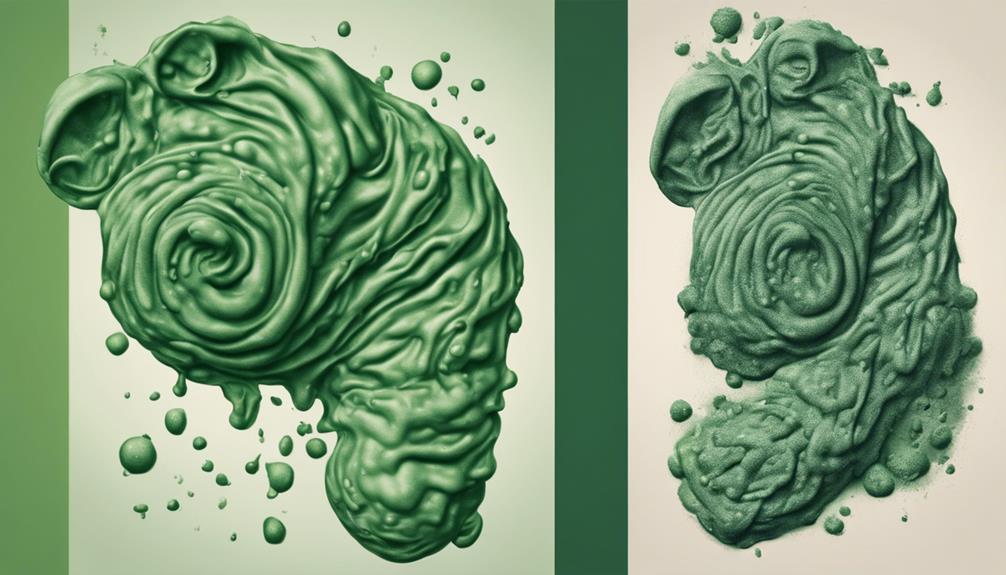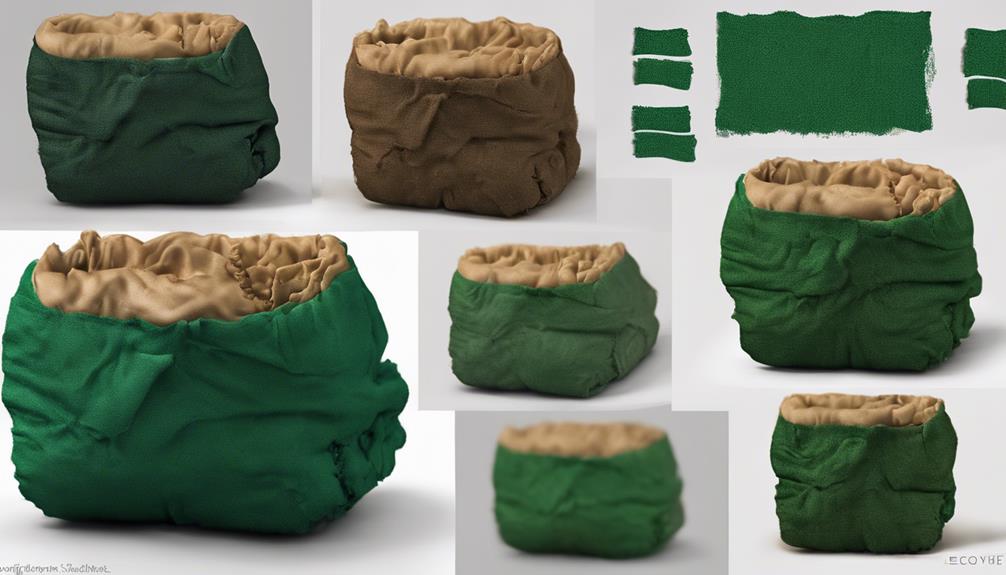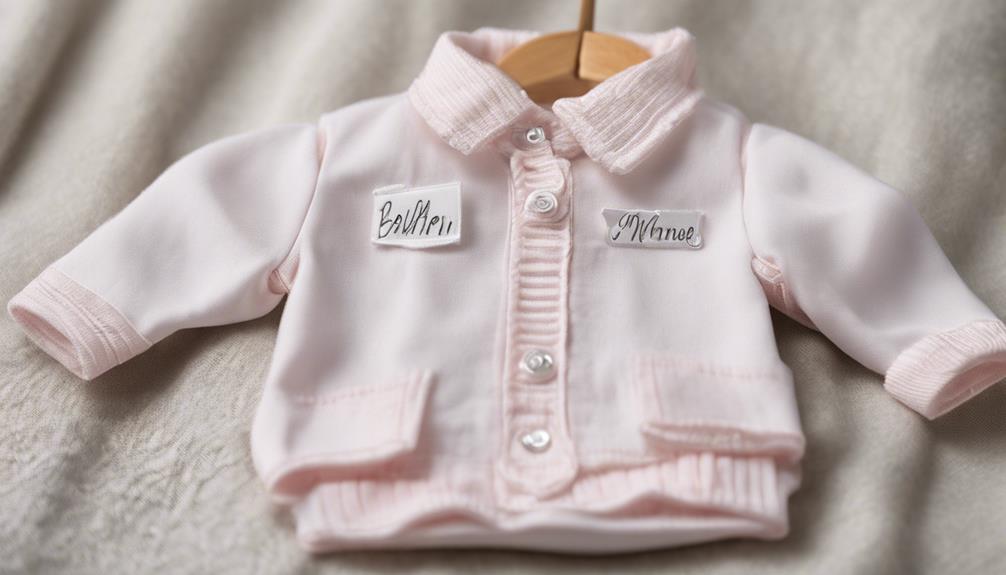As parents, we often find ourselves confronted with the unexpected and the unknown when it comes to our little ones. Dark green newborn poop may seem alarming at first, but understanding the reasons behind it can provide valuable insights into our baby's health.
So, what exactly does this color indicate, and when should we be concerned? Let's unravel the mysteries together and equip ourselves with the knowledge needed to navigate this aspect of parenthood with confidence and clarity.
Key Takeaways
- Dark green poop in newborns can be normal due to bile presence.
- Abnormal dark green poop may signal issues like diet sensitivity or imbalance.
- Managing dark green poop involves addressing feeding imbalances and seeking medical advice.
- Persistent dark green poop warrants consultation with a healthcare provider for proper evaluation.
Causes of Dark Green Newborn Poop
Dark green newborn poop is often attributed to the presence of bile, a digestive fluid produced by the liver. When a baby consumes mostly foremilk and lacks the balance of hindmilk, the stool can appear dark green. Additionally, iron supplements or iron-fortified formula may also cause the poop to take on a darker hue. For breastfed babies, dark green poop could signal a sensitivity to certain foods in the mother's diet, such as consuming a lot of leafy greens. These factors can lead to temporary changes in the color of newborn poop.
Understanding the various causes of dark green poop in newborns is essential for parents to differentiate between normal and abnormal stool color. While temporary changes like dark green poop are usually harmless, it's important to watch out for any accompanying worrisome symptoms that may indicate a more serious issue. By being aware of these factors, caregivers can better navigate the spectrum of newborn poop colors and textures.
Normal Vs. Abnormal Dark Green Poop

When considering newborn poop color variations, understanding the distinction between normal and abnormal dark green stool is crucial for parents' awareness of potential digestive issues in their infants.
- Normal dark green poop: Newborns often pass dark green stool in the first days after birth as their digestive system shifts from meconium to the presence of bile pigments. This process is a natural part of their development.
- Abnormal dark green poop: If your newborn consistently has dark green poop with a frothy consistency, it could indicate issues such as foremilk/hindmilk imbalance, lactose overload, or formula intolerance. These conditions may require adjustments to feeding routines or formula choices.
- Seeking professional advice: If dark green poop persists beyond the initial days after birth or is accompanied by concerning symptoms like excessive fussiness, poor weight gain, or blood in the stool, consulting a healthcare provider is recommended. They can provide guidance on managing any potential underlying issues effectively.
How to Manage Dark Green Poop
To effectively manage dark green newborn poop, it is essential to address potential causes such as foremilk/hindmilk imbalance or dietary sensitivities. Ensuring a proper balance between foremilk (the watery milk at the beginning of a feeding) and hindmilk (the creamier milk at the end) during breastfeeding can help alleviate the issue. Additionally, paying attention to the mother's diet and identifying any potential triggers that could be causing sensitivity in the newborn is critical for managing dark green poop. Here is a table outlining steps to manage dark green poop effectively:
| Management Steps | Description |
|---|---|
| Check breastfeeding technique | Ensure proper latch and encourage longer nursing sessions to balance foremilk and hindmilk intake. |
| Monitor mother's diet | Identify and eliminate potential triggers in the mother's diet that could be causing sensitivity. |
| Consult healthcare provider | If dark green poop persists or is accompanied by concerning symptoms, seek advice from a professional. |
When to Seek Medical Advice
Monitoring the newborn's poop color closely is essential for identifying any potential health concerns that may require medical attention. When it comes to dark green newborn poop, knowing when to seek medical advice is important.
Here are three key points to take into account:
- Duration: If the dark green poop persists beyond the initial meconium stage and continues for more than a week, it may signal an imbalance in foremilk and hindmilk, necessitating adjustments in feeding routines.
- Sensitivity: Persistent dark green poop in a newborn could indicate a sensitivity to certain foods or formulas. In such cases, it's advisable to consult a healthcare provider to address the issue promptly.
- Accompanying Symptoms: Seeking medical advice is recommended if dark green newborn poop is accompanied by other symptoms such as fussiness, poor feeding, or changes in behavior. These additional signs could indicate an underlying health issue that requires attention.
Tips for Handling Dark Green Poop
Handling dark green poop in newborns requires close attention to feeding patterns and possible sensitivities to identify any underlying issues promptly.
The green hue of the stool is a result of bile pigments present in the digestive system, especially during the shift from meconium to transitional stool.
For breastfeeding infants, encouraging frequent nursing sessions can help balance the foremilk and hindmilk intake, potentially affecting stool color.
It's important to monitor the baby's hydration, overall health, and feeding routines alongside the color of the poop. If dark green poop continues beyond the initial week, particularly when accompanied by other concerning symptoms, seeking guidance from a healthcare provider is essential.
Frequently Asked Questions
What Does Dark Green Poop Mean in Newborns?
Dark green poop in newborns may indicate a foremilk/hindmilk imbalance, possibly from excess lactose or iron supplements. If it persists beyond dietary causes, it could signal a health concern needing a doctor's attention.
Is Dark Green Poop Normal for Baby Formula-Fed Teething?
Absolutely! Dark green poop in formula-fed teething babies is quite common. Due to increased saliva ingestion, their stool color may temporarily change. It's typically nothing to worry about and tends to resolve on its own.
What Is a Newborn Passing Greenish-Black Stool of Tarry Consistency?
Passing greenish-black stool of tarry consistency is normal for newborns as it's meconium, comprising amniotic fluid, bile, and intestinal secretions. Reflecting the time in the womb, this sticky stool shows the digestive system is functioning properly.
Does Dark Green Baby Poop Mean Allergy?
Dark green baby poop doesn't always indicate an allergy; it might be due to foremilk/hindmilk imbalance. Only 2-5% of babies have a true milk protein allergy. Consult a professional for guidance. Don't stress unnecessarily.
Conclusion
To wrap up, dark green newborn poop may seem intimidating, but with proper understanding and monitoring, it's nothing to fear!
Remember, a little green in your baby's diaper is just a sign of a healthy digestive system at work.
Trust your instincts, follow the guidelines provided, and rest assured that your baby's poop is just one colorful aspect of their amazing growth and development journey.
Keep calm and carry on changing those diapers!









